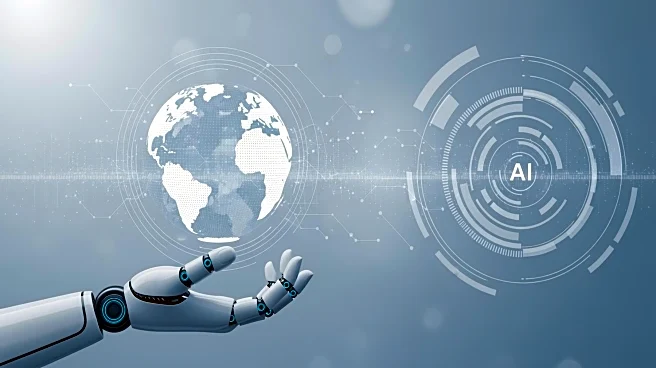What's Happening?
Amazon is set to reduce its corporate workforce by 30,000 jobs, which represents 9% of its global office-based employees. This move is part of a broader restructuring effort focused on integrating artificial
intelligence and robotics into its operations. The layoffs, which will begin on Tuesday, are expected to unfold over several weeks and affect multiple departments, including human resources and operations. CEO Andy Jassy, who took over from Jeff Bezos in 2021, has previously implemented significant job cuts, targeting Amazon Web Services and entertainment units. The company is also investing heavily in AI and cloud infrastructure, with plans to automate a significant portion of its fulfillment operations by 2033.
Why It's Important?
The decision to cut 30,000 jobs underscores the growing impact of artificial intelligence on the workforce, particularly in the tech industry. Amazon's move reflects a broader trend among major tech companies like Meta and Alphabet, which are also reducing staff as they pivot towards AI-driven efficiencies. This restructuring could lead to significant cost savings for Amazon, potentially enhancing its long-term profitability. However, it also raises concerns about job security and the future of work, as automation threatens to replace a substantial number of roles. The layoffs may affect employee morale and could lead to increased scrutiny from labor advocates and policymakers.
What's Next?
As Amazon proceeds with its layoffs, the company will likely face reactions from various stakeholders, including employees, investors, and labor groups. The focus will be on how Amazon manages the transition and supports affected employees. Additionally, the company's continued investment in AI and automation will be closely watched, as it could set a precedent for other industries. Amazon's plans to hire 250,000 seasonal workers for the holiday season may provide temporary relief, but the long-term implications of its restructuring strategy will remain a topic of interest.
Beyond the Headlines
The shift towards automation and AI at Amazon highlights a significant cultural and operational transformation within the company. This move could redefine the nature of work in the tech industry, emphasizing the need for employees to adapt to new technologies. It also raises ethical questions about the balance between technological advancement and workforce stability. As Amazon continues to streamline its operations, the broader implications for labor markets and economic inequality will be important areas for ongoing discussion.












